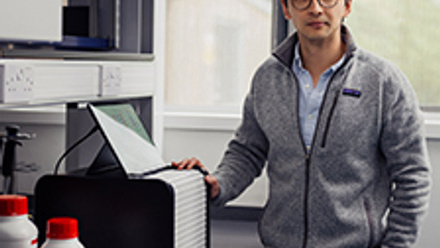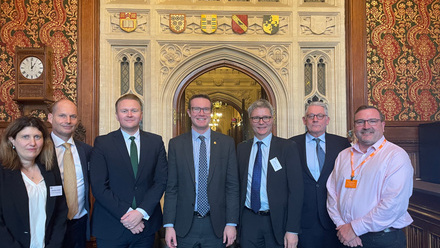LinkGevity awarded deep-tech EU grant
LONDON, Sept. 19, 2024 -- LinkGevity, an AI-driven drug discovery company focused on longevity and age-related disease, has been selected to receive a highly competitive Women TechEU grant. Women TechEU is a project funded through Horizon Europe, the EU’s flagship research and innovation funding program.
The award, one of only 40 out of over a 1,000 applications from across 38 eligible countries, recognises LinkGevity’s groundbreaking work in tackling complex, age-related diseases through an innovative approach to drug discovery. The company leverages its proprietary Blueprint Theory of Aging, which identifies critical pathological pathways shared across multiple diseases and conditions. This breakthrough allows us to move beyond traditional single-disease therapies, enabling the development of broad-spectrum therapeutics that target the root causes of multiple age-related conditions simultaneously.
Using this innovative approach, the company has already discovered a promising “Anti-Necrotic” therapeutic, which targets a key biological pathway linked to six of the top ten global causes of death. This same pathway has for years been a stumbling block in organ preservation, cryopreservation, and bio-engineering. LinkGevity has recently been recognised by NASA’s Space-H program for its work which could help support deep-space missions and protect astronaut health (press release here).
“Our AI-driven platform identifies shared molecular pathways across diseases, offering the potential to treat complex multifaceted conditions more effectively,” said Dr. Carina Kern, CEO and co-founder of LinkGevity.
This isn’t just about discovering one drug for one disease - we’re uncovering entire classes of therapeutics with applications across multiple diseases. And because the pathways we uncover are so fundamental in biological collapse, our therapeutics have wider potential, even outside the body, in uses such as organ preservation, bioengineering, and cryopreservation.
Serena Kern Libera, co-founder and Chief Operating Officer, emphasized the personal drive behind the company’s mission: “Age-related diseases are on the rise, but current medical approaches struggle to treat them effectively. My sister and I saw the decline that happened in our dear grandparents. The assumption that a systemic collapse due to aging was inevitable was something we couldn’t accept. We set up LinkGevity in the hope of bringing about a new paradigm in drug discovery. It’s a prestigious honor to be recognised for our Deep Tech Leadership. This grant will enable us to accelerate the development of our technology, empowering us to bring transformative treatments to market and reshape the future of drug discovery.”
Traditional drug discovery approaches, which generally focus on single therapeutics for specific diseases, have struggled with age-related diseases which are by nature multifactorial. LinkGevity’s technology platform seeks to disrupt this model by developing therapeutics that target key pathways across multiple diseases, offering the potential for a more comprehensive and effective approach to treatment.
The Women TechEU grant, awarded through a rigorous evaluation process, is reserved for Europe’s most promising women-led deep tech startups. Each selected company receives non-dilutive funding, along with a personalized business development package that includes expert mentoring, coaching, and targeted training. LinkGevity will also benefit from tailored sessions on commercialization and connections within the EU’s deep tech community, providing vital support as the company continues to scale. With the support of the Women TechEU program, LinkGevity aims to continue challenging traditional approaches and deliver innovative solutions to some of the most pressing healthcare challenges of our time.
About LinkGevity
LinkGevity is an AI-driven drug discovery company focused on longevity and age-related disease. The company is on a mission to revolutionize healthcare by intervening in previously untreatable conditions, with a strong emphasis on licensing its groundbreaking IP to pharma and life science companies worldwide to allow maximum impact.
LinkGevity’s novel proprietary Blueprint Theory of Aging, developed by CEO and co-founder Dr. Kern, offers a comprehensive, multi-disciplinary framework for understanding the development of age-related diseases and deterioration. This theory integrates insights from medicine, genetics, evolutionary biology, and molecular biology. The Blueprint Theory enables the company’s AI to accurately identify and target key biological pathways involved in aging and deterioration, with necrosis being one of the most critical processes addressed.
The company is currently wrapping up its Angel round of funding, with the raised funds earmarked for advancing its already discovered Anti-Necrotic technology as well as further developing its technological platform.
LinkGevity is based at the Babraham Research Campus in Cambridge, UK. For more information see the website and follow the company on LinkedIn.
About AI-driven Drug Discovery
AI-driven drug discovery has become a major area of investment, yet traditional methods have struggled to effectively address the intricate nature of age-related diseases. This is partly because age-related diseases are multifactorial, meaning they result from a combination of factors. Current medical approaches struggle to treat them effectively because single therapeutics are limited in their ability to address the multiple, interacting biological pathways involved in these complex conditions.
Diseases are often classified into separate categories in medical textbooks for convenience and for treatment purposes. However, at a biological level, many diseases share key underlying pathways that drive their progression. Certain biological mechanisms are central to the development of multiple conditions.
Identifying and targeting these core pathways could lead to much more effective treatments that address the root causes of multiple diseases, rather than focusing on individual conditions in isolation.






